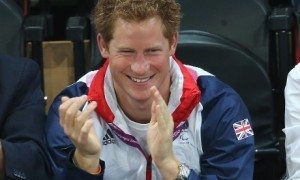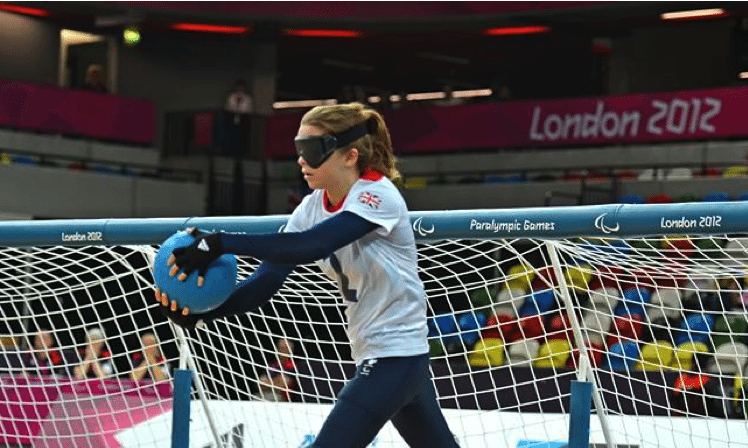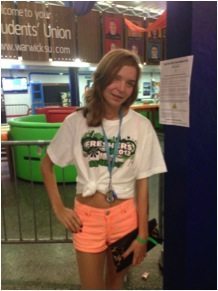Amy Ottaway: Paralympic Star and Warwick Fresher!
On arrivals weekend 2013, many fresh faced first years were welcomed into the numerous Warwick halls of residence. Amongst these excited students was 20-year-old Amy Ottaway, and her guide dog, Abba.
The History and Politics student from Norwich felt pangs of nerves like most other first years, not least because she has been partially sighted since birth. Thus, the initial experience of University is that bit more challenging for her. Amy suffers from coloboma and nystagmus, conditions that affect the structure and movement of the eye.
Yet Amy hasn’t let her disability inhibit her in any way; in fact she has embraced it and participates in the Paralympic event Goalball. In 2012, Amy even made it into the Team GB squad, representing our country in this unique and inclusive sport, before sitting her A-Levels and gaining a place at Warwick.
I interviewed the young sports star to find out how she has settled into Uni life, to discuss the lack of disability sports available to practice on campus, and to reflect on her memories of London 2012.
Chloe: Firstly, how are you settling into life at the University of Warwick?
Amy: It took a little while in terms of getting used to the size of the campus and the huge amounts of reading there is on my course, but one term into it and I really love University life. My friendly flat mates, and the occasional night out, are definite perks.
C: Good to hear. I must also wish you congratulations on the success that your team had in the 2012 Paralympics- where you made it to the quarterfinals! How was the whole Paralympic experience?
A: Well, we certainly bettered people’s expectations of how much we’d achieve, which was outstanding. Whilst there are opportunities for me to attend and participate in another Paralympics I don’t think that I’ll ever experience another reception like the one we got from the home crowd in London; it is beyond description and by far the most amazing thing I have ever been a part of. Of course, it was a little overwhelming to be thrown into an 8,000 seater stadium, but the crowd were such an amazing boost to our performance.

Prince Harry attended the Great Britain match against Denmark where Amy and her team won 5-0, with Amy scoring one of those goals. Photo: Chris Jackson/Getty Images
C: Overall, what was your proudest moment of competing on the world stage?
A: Just getting to be a part of the squad and representing my country at a Paralympics made me immensely proud, but scoring a goal for Team GB in front of all my family and Prince Harry in our 5-0 victory against Denmark has to be a highlight.
C: Please could you explain a little bit about what Goalball is, for someone who doesn’t already know?
A: Goalball is a sport for blind and visually impaired athletes. The object of the game is to score a goal by throwing the ball along the ground and shooting into the opposition’s goal. At international level shots can reach between 40 and 60mph! The opposition aims to prevent goals by defending with any part of their body whilst remaining in their team area.
C: You have been playing Goalball since 2008, and professionally since 2010, alongside your secondary school education. Then, the Paralympics coincided with your A Levels. How did you manage to keep up your grades alongside a thriving sporting career?
A: My school was really helpful as they allowed me to split my A Levels over three years, so the workload each year was eased. This measure took a considerable amount of pressure off. A lot of hard work in both academia and sport was required, and it paid off.
C: So, how intense is the training?
A: Particularly in the year leading up to the games, training was so intense with a few training weekends per month, as well as gym work most days – whether that be weights or cardio. You also have to be extremely sensible with what you eat so that you get the most out of training and build up strength properly, because at its core Goalball is a power sport.
C: Is Goalball your favourite sport to play, or is it simply what you are best at?
A: Both; I particularly love the team element to the game, as well as the excitement and quick pace. I’ve always had an interest in, and followed, sport, however before Goalball any participation was purely recreational. For instance, I do a lot of swimming and skiing, but not at a competitive level.
C: In terms of being a spectator then, what sport do you most enjoy following?
A: In terms of Olympic sports I love watching athletics, diving and gymnastics, but football would be the other main one that I follow. My uncle’s a season ticket holder at Old Trafford so I’ve always been a Manchester United fan. I also really admire and aspire to be like Tanni Gray Thompson and Mo Farah; their attitudes are brilliant. They’re so immensely dedicated to their events.
This spectator clip shows Amy Ottaway in the lineup against Sweden in the quarter final.
C: Now, back to Uni life, what societies have you got involved with at Warwick so far?
A: To be honest, I haven’t really got involved with many clubs other than the Politics Society, who I often go circling with. Next term, when I have fully settled in, I plan to get involved more though.
C: Obviously you aren’t a member of any Goalball club here because there isn’t one.
A: It’s a shame that Goalball gets so little coverage in general. It’s a great sport that everyone can get involved with because everyone wears blacked out eyeshades so each player is somewhat on a level pegging in terms of disability. If there was enough interest then having a Goalball society at Warwick would be excellent.
C: In fact, there aren’t any Paralympic sport clubs on campus. Does this need to be addressed?
A: This is something that I definitely think needs to be looked at, and not only in order to increase participation or equality, but rather because everyone can get a lot out of Paralympic sports. Whilst at the London games, for example, I fell in love wheelchair rugby, which reasserted to me how great the sports are in their own right. So, it is a great shame that at a University with so many clubs there aren’t any Paralympic based ones.
C: Although the opportunity currently isn’t there to carry on with Goalball on campus, do you intend to carry on with the sport outside of University, and then after you have graduated?
A: Currently the opportunity for Goalball to be my career is not an available option but I do intend to stick with it during my time here. I took a couple months off when I started University, but I will return to it soon.
C: And will you join Team GB in Rio de Janeiro for the next games in 2016?
A: At the moment I am unsure as not only will it be a challenge to qualify but we are now in a position where there is a lot more competition for places. Nevertheless, I’ll give it my best shot. Naturally I would love nothing more than to compete in 2016.
C: Best of luck!
The highlights of Goalball 2012. Amy’s goal unfortunately isn’t featured in this video, but if you look closely enough you will be able to see the Paralympian waving to the home crowd a couple of times.


Comments